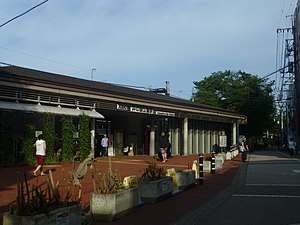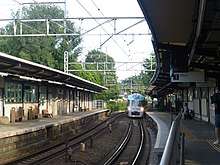Inokashira-kōen Station
Inokashira-kōen Station (井の頭公園駅, Inokashira-kōen-eki) is a railway station on the Keio Inokashira Line in Mitaka, Tokyo, Japan, operated by the private railway operator Keio Corporation.
Inokashira-kōen Station 井の頭公園駅 | |
|---|---|
 Inokashira-koen Station, July 2016 | |
| Location | 3-35-12 Inogashira, Mitaka-shi, Tokyo (東京都三鷹市井の頭三丁目35番12号) Japan |
| Operated by | |
| Line(s) | |
| Platforms | 2 side platforms |
| History | |
| Opened | 1933 |
| Traffic | |
| Passengers (FY2014) | 6,587 daily |
Lines
Inokashira-kōen Station is served by the 12.7 km Keio Inokashira Line from Shibuya in Tokyo to Kichijōji. Located between Mitakadai and Kichijōji, it is 12.1 km from the Shibuya terminus.[1]
Service pattern
Only all-stations "Local" services stop at this station. During the daytime, there are eight services per hour in either direction.
Station layout

The station has two opposing ground-level side platforms serving two tracks.[2] The station building is located on the side of the Kichijoji-bound platform, and connected to the Shibuya-bound platform by an underground passageway.
In July 2006, the station underwent renovations to provide universal accessibility, including installation of elevators, toilets, and renovations of the station office.
Platforms
| 1 | ■ Keio Inokashira Line | for Kichijōji |
| 2 | ■ Keio Inokashira Line | for Shimo-Kitazawa, Meidaimae, and Shibuya |
Adjacent stations
| « | Service | » | ||
|---|---|---|---|---|
| Keio Inokashira Line (IN16) | ||||
| Express: Does not stop at this station | ||||
| Mitakadai (IN15) | Local | Kichijōji (IN17) | ||
History
The station opened on 1 August 1933.[1]
From 22 February 2013, station numbering was introduced on Keio lines, with Inokashira-kōen Station becoming "IN16".[3]
Passenger statistics
In fiscal 2014, the station was used by an average of 6,587 passengers daily.[4]
The passenger figures for previous years are as shown below.
| Fiscal year | Daily average |
|---|---|
| 1999 | 5,697[1] |
| 2010 | 6,682[5] |
| 2011 | 6,590[5] |
Surrounding area
The station is close to Inokashira Park, the source of the Kanda River and is a favorite spot for springtime hanami, or cherry-blossom viewing.
It is situated in a quiet residential area with only a handful of shops and restaurants, but Kichijōji is only a 10-minute walk away (600 m).
References
- Terada, Hirokazu (July 2002). データブック日本の私鉄 [Databook: Japan's Private Railways]. Japan: Neko Publishing. p. 206. ISBN 4-87366-874-3.
- Kawashima, Ryozo (April 2010). 日本の鉄道 中部ライン 全線・全駅・全配線 第1巻 東京駅―三鷹エリア [Railways of Japan - Chubu Line - Lines/Stations/Track plans - Vol 1 Tokyo Station - Mitaka Area]. Japan: Kodansha. pp. 12, 55. ISBN 978-4-06-270061-0.
- 京王線・井の頭線全駅で「駅ナンバリング」を導入します。 [Station numbering to be introduced on Keio Line and Inokashira Line] (PDF). News release (in Japanese). Keio Corporation. 18 January 2013. Retrieved 25 March 2013.
- 1日の駅別乗降人員 [Average daily station usage figures] (in Japanese). Japan: Keio Corporation. 2014. Retrieved 25 March 2016.
- 1日の駅別乗降人員 [Average daily station usage figures] (in Japanese). Japan: Keio Corporation. 2013. Retrieved 25 March 2013.
External links
| Wikimedia Commons has media related to Inokashira-Kōen Station. |
- Keio Inokashira-kōen Station information (in Japanese)